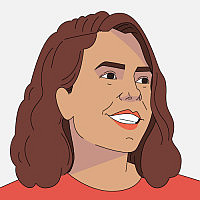

| View this email in your browser | ||

|
May 14, 2024 | |

|
||

|
||
| Vera Sajrawi | ||
|
How a Palestinian psychologist helped explain my family’s trauma |
||
|
Being human is no piece of cake. In childhood, a mere inconvenience might leave you with long-lasting scars, or your caregivers might unintentionally leave you with trauma that could last a lifetime if you do not actively work toward overcoming it. Most of us, after all, are adults with a hurt inner child that is begging for healing. Being a Palestinian is definitely not a piece of cake, either, no matter if you are living in historic Palestine or in the diaspora. No matter how much you try to protect your mental health and well-being, the traumas of living under occupation and exile will scar you deeply. I have lived most of my life trying to understand those scars and tend to them; at some points, the trauma of being Palestinian made it nearly impossible to function. I was born into an internally displaced refugee family, meaning that when Israel was established, its forces destroyed our village — Al-Sajara — and we became refugees in another Palestinian community inside the new state. To this day, even though we hold Israeli citizenship, my family is barred from returning and living on their original land. During the 1948 war, my paternal grandparents were uprooted and stripped of all their property following a bloody battle in their village between Palestinian fighters and Zionist militias. Before that, they lived in Al-Sajara alongside a number of Jews who immigrated from Europe and worked with them in farming. As a child, my grandparents never spoke to me about what happened during the Nakba (“catastrophe”). My grandfather was likely clinically depressed after losing everything, including his youngest sister, who was 16 when the Zionist militias shot her dead during the invasion of the village. I used to think that his silence was simply a sign of his tranquil demeanor, as opposed to my grandmother, who was always irritated and expressive. Stories about what happened in 1948 came instead from other family members. My parents, too, withheld our family history from me when I was growing up. They thought they were protecting me, but I was emotionally intelligent enough to pick up on cues and create a picture, however basic, of what happened to us. I spent my elementary and middle school years trying to figure out why Israelis hated me, and why Palestinians living in Israel have internalized so much of that anger. Then, I realized that the more I learn and teach about my ancestors and what they endured, the more I gained a sense of inner resilience. Since then, I have not stopped studying the effects of continuous violence, in all its forms, on the Palestinian psyche. Having an internal refugee family exposed me to many forms of resilience. My grandparents had to rebuild their lives from scratch, forced to adapt to a new village under a military regime that controlled all aspects of their lives until 1966. My father, aunts, and uncles grew up in extreme poverty after my grandfather lost his land. They also absorbed their parents’ PTSD. My grandmother, on the other hand, was extremely angry at their forced condition, yet she worked hard and raised her kids to be hardworking too. This is a glimpse of my personal story, but it is a very common Palestinian one: you work hard to survive, despite all the hardships that life throws your way, while also trying to take care of your mental health. One of the starkest demonstrations of this resilience was on display in May 2021, when Palestinians led a mass uprising against the Israeli state. The ensuing repression spread to nearly all corners of the land; Palestinians in Gaza endured another heavy bombardment by the Israeli army, and even Palestinians inside Israel and the West Bank were exposed to lynching, police and military brutality, and a pervasive sense of danger as security forces abetted settler attacks. In the months following the uprising, I heard about a network of Palestinian psychologists who had formed support groups inside Israel in order to provide emergency mental health care to Palestinian victims of Israeli violence and their families. To learn more about the initiative, I interviewed psychologist Asrar Kayyal in what I now consider one of the most important interviews I have conducted in my 15 years in journalism. I thought I knew enough about how to maintain mental well-being while living under occupation. But after speaking to Asrar for several hours, I realized there is still a lot to learn about the complexity of Palestinian trauma and how to overcome it. It is crucial for us to understand these open wounds, and to support Palestinians in their journey toward healing them. For what is the point of living with other humans if not to collectively help each other confront our traumas, so that we can enjoy living beyond them? Before you go: Producing the newsletter, like every other aspect of our work, requires time and resources. Become a member of +972 Magazine to help us sustain our work and bring you the kind of analysis from on the ground in Israel-Palestine that you won’t find anywhere else. |

|
|
|
| PHOTOS, IN ORDER OF APPEARANCE: | ||
| Asrar Kayyal (Faiz Abu Rmeleh), Rafah Crossing (Flash90), Unearthing graves of Yemenite children (Oren Ziv), An-Nabi Samwil (Keren Manor), Culture of Solidarity (Alice Austin), Invasion Day rally in Melbourne (Matt Hrkac), Sumud Freedom Camp (Ahmad Al-Bazz), Women of Masafer Yatta (Screenshot from SocialTV) | ||
| About | Privacy Policy | Unsubscribe | ||
| +972 Magazine is an independent, non-profit media initiative, supported largely by our readers. | ||
| © 2024 +972 Magazine. All Rights Reserved. | ||